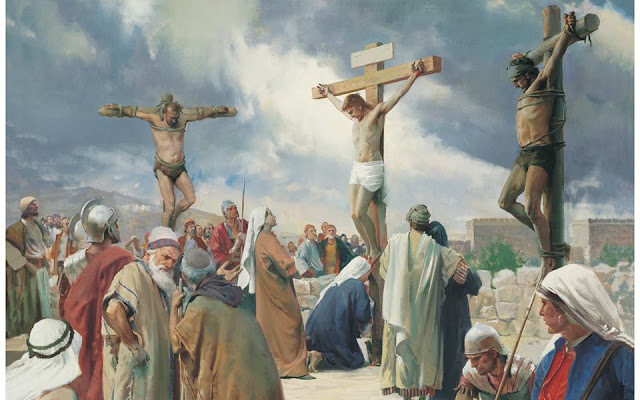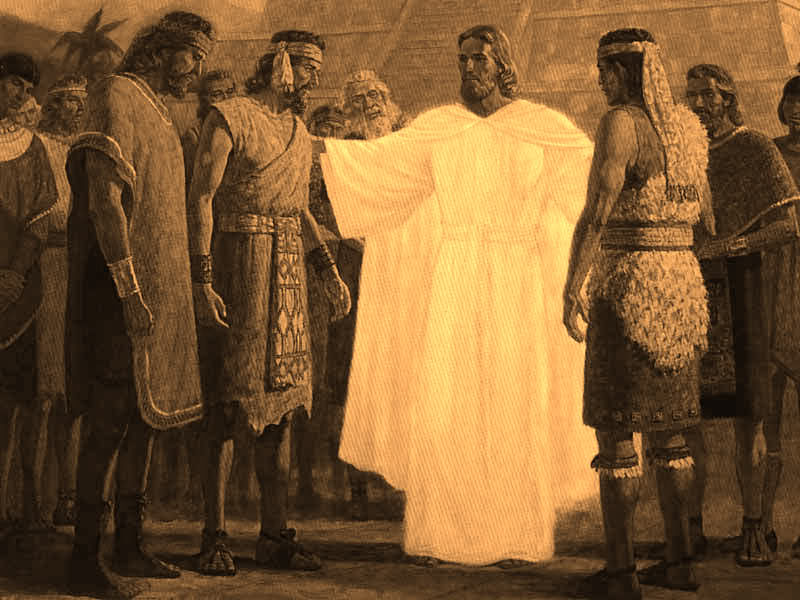Question
Gramps,
Why did Christ have to go through all that suffering? I mean, why was that; Gethsemane, and the cross, the process selected to save us from the fall and its effects? I know that it is similar to animal sacrifices in the Old Testament. But why did God choose this way of doing things?
Marcus
Answer
Marcus,
This is an excellent question! When we consider the sacrificial offering of the Lamb of God, we marvel, not only at the submissiveness of the Messiah, but also at the violence and humiliation associated with his death. The events of the betrayal, the trials before Caiaphas, Pilate, and Herod, the abuse by guards, the scourging, the mocking crown of thorns and purple robe, and ultimately the crucifixion are shocking in their brutality.
There are times in history when the confluence of the personal inclinations of individuals, foreordination, and free will create a sort of inescapable momentum. If the right elements are put together, both transcendent and tragic events can occur as agency unfolds the consequences of individual choices. A positive example of this would be the founding of the United States. The conditions were ripe for a group of well-heeled, educated men, steeped in the principles of the Enlightenment, to erect a civil government that would guarantee individual liberty and provide a suitable “cradle” for the Restoration to occur. A negative example would be the conditions in the aftermath of World War I, the failure of the Treaty of Versailles, and the economic pressures that led to the rise of Adolph Hitler, World War II, and the Holocaust.
The combined events that make up the atonement were the pivotal point in history where the combined agency of the individuals involved, the foreordination of the Messiah’s mission, and the religious, social, and political conditions came to a head. It was a singular moment of spiritual warfare that had begun in the war in heaven in the premortal life.
The political climate, Israel being under Roman rule, the rise of false messianic zealots, and the presence of corrupt political appointees like Pilate and Herod, formed a culture of violence, graft, corruption, and barbaric penalties like crucifixion. These men became Satan’s mortal agents. The enemy of all righteousness had such influence over them that their decisions could be counted upon to be based in self-interest, self-preservation, ambition, and lust for power.
Likewise, the effect of the Babylonian captivity after the dispersion in the days of Jeremiah and Lehi was that Israel was left in a period of some 400 years without prophets in their midst. The Pharisees and the Sanhedrin became the conservators of the Jewish faith against the very real possibility that their people would forsake their religion and adopt Babylonish ways. Like today’s Protestants who say “A Bible, a Bible…there cannot be any more Bible…,” (See 2 Nephi 29:3) the Jewish religious leaders of Jesus’ time were suspicious of any who came declaring new revelation. There had been false messianic movements that provoked the Romans to strike back with unbelievable cruelty.
Annas and Caiaphas served in their positions only with Roman approval. Their chief concern was to preserve Israel from destruction by the Romans. Much as sectarian Christians in our time were offended by Joseph’s account of the first vision which labeled their creeds as “abominations,” the scribes and Pharisees bristled at Jesus’ condemnation of their hypocrisy. Pride, religious intolerance, slavish devotion to orthodox interpretations of a religious text, etc. caused hostile feelings toward Jesus and His followers. They were overcome by their intolerance and also became agents of Lucifer’s will.
Into this swirling cauldron of vice, corruption, religious zealotry, hypocrisy, and intolerance, Jesus brought a message that challenged a tentative church/state arrangement that held the peace together barely. His teaching stirred up people across cultural lines of class and status. He attracted interest from distinguished men like Joseph of Arimethea and Nicodemus as well as publicans, harlots, and other sinners. He challenged long-accepted traditions and said they had no basis in God’s law.
The “perfect storm” of personalities led to deep conflict and resentment. Caiaphas and Annas were so determined to rid themselves of Jesus of Nazareth that they, according Talmage’s Jesus the Christ, were willing to hold a trial that defied centuries of legal precedence they claimed to uphold (Talmage, 644-648). After convicting Jesus of blasphemy, a capital offense that they had not authority to punish, they changed the charge to treason and brought Jesus to Pilate. Pilate found no reason to execute Jesus, but because he lacked a moral backbone, he transferred the case to Herod because Jesus was a Galilean and thus, under Herod’s jurisdiction. Herod found no reason to convict Jesus, but still allowed him to be mocked and beaten before sending him back to Pilate. The religious leaders who sought Jesus’ death put political pressure on Pilate to get their way. Rather than follow his troubled conscience and the inspired warning of his wife’s unsettling dreams about Jesus, Pilate sent Jesus to the cross without even pronouncing a guilty verdict upon him.
The Roman guards had lived lives of hardship and brutality. They couldn’t see Jesus as anything more than a common criminal. Crucifixion was only reserved for the lowest classes and basest criminals. It was a tortuous death for anyone, but Jesus had already spent a sleepless night in agony in Gethsemane, been dragged to two different hearings, and finally, forced to carry his cross to Golgotha at the very limit of His physical strength.
Even as He hung on the cross with nails through His hands, wrist, and feet, some of the skeptics mocked Him. They waited for a sign or a miracle to occur. Through them, Satan’s voice tried to insinuate doubts, just as he had done after the forty days in the wilderness. If Jesus was really the Son of God, shouldn’t He be able to call upon his Father for deliverance? Couldn’t He come down off the cross with a legion of angels to protect Him? How could He expect to save others if He could not save himself? Even in the greatest moment of agony, God the Father Himself withdrew His presence.
Jesus had never known this degree of loneliness. He had always been able to draw strength from his Father, but in the final test of resolve, He had to face annihilation totally alone.
Each of us fears death. Our bodies are wired with a self-preservation instinct. Even though we have faith in Christ today, the fear of death still hangs over us. At death’s door, each of us must confront the possibility that our existence might end forever. When Jesus reached that moment, it was necessary for Him to face death as each of us has to do. He—the Lord of Life—had to stare into the abyss of death that hung over all eternity and enter it.
The scriptures give us some insights into why Jesus submitted himself to this abuse. The Psalmist wrote these messianic verses:
12 What shall I render unto the Lord for all his benefits toward me?
13 I will take the cup of salvation, and call upon the name of the Lord.
14 I will pay my vows unto the Lord now in the presence of all his people.
15 Precious in the sight of the Lord is the death of his saints.
16 O Lord, truly I am thy servant; I am thy servant, and the son of thine handmaid: thou hast loosed my bonds.
17 I will offer to thee the sacrifice of thanksgiving, and will call upon the name of the Lord.
18 I will pay my vows unto the Lord now in the presence of all his people,
19 In the courts of the Lord’s house, in the midst of thee, O Jerusalem. Praise ye the Lord (Psalms 116:12-19).
The Lord Jesus owed no debt for the penalty of any sin. He paid His vows in taking upon Himself our sins. The unimaginable weight of all the sins ever committed was staggering even to Jehovah Himself, who prayed in Gethsemane that the cup might pass Him by. When we consider not only our personal sins, but the gross cultural and societal sins of nations and empires—all the atrocities of wars, religious persecution, purges, pogroms, murders, we only begin to fathom the depths of misery and suffering that sin has brought into the world. All the weight of all human suffering, pain, hardship, disease, and even death fell upon Jesus, not only in Gethsemane, but upon the cross as well.
The excruciating pain he endured should give us pause. This is the price of sin. Our sins. Jesus told Joseph Smith:
16 For behold, I, God, have suffered these things for all, that they might not suffer if they would repent;
17 But if they would not repent they must suffer even as I;
18 Which suffering caused myself, even God, the greatest of all, to tremble because of pain, and to bleed at every pore, and to suffer both body and spirit—and would that I might not drink the bitter cup, and shrink—(D&C 19:16-19)
If we do not repent, we will suffer even as Jesus did. His suffering rightly belongs to us. If His kindness and mercy is not inspiration enough to repent, certainly the ferocity of His suffering should be a prime reason. He underwent this suffering willingly. Justice requires that every single act of sin be atoned for. The entire price had to be paid before mercy could be extended to any of us. We read in Alma:
11 And he shall go forth, suffering pains and afflictions and temptations of every kind; and this that the word might be fulfilled which saith he will take upon him the pains and the sicknesses of his people.
12 And he will take upon him death, that he may loose the bands of death which bind his people; and he will take upon him their infirmities, that his bowels may be filled with mercy, according to the flesh, that he may know according to the flesh how to succor his people according to their infirmities.
13 Now the Spirit knoweth all things; nevertheless the Son of God suffereth according to the flesh that he might take upon him the sins of his people, that he might blot out their transgressions according to the power of his deliverance; and now behold, this is the testimony which is in me (Alma 7:11-13).
Because the Savior underwent this torment, He is filled with an infinite compassion.
“He that ascended up on high, as also he descended below all things, in that he comprehended all things, that he might be in all and through all things, the light of truth…” (D&C 88.6).
None of us can ever say, in all of eternity, that the atonement did not treat him or her fairly. Jesus descended below all things. No one was ever more heartbroken, anguished, tormented, forsaken, and alone. We cannot even imagine the depths of His suffering. In taking this upon Him, it was His intention to draw all men unto Him (John 12:32). Every single person, from Adam down to the last child born at the Millennium’s end, is necessarily drawn to Jesus Christ for a final reckoning of our spiritual account. What debt to we owe Him? What can we render to Him in return in recognition for what He underwent for each of us? Only a broken heart and a contrite spirit will suffice.
When we “stand all amazed at the love Jesus offers” us, we can only bow the knee and confess that He is the Christ, the Son of God, and the Savior of the World.
References:
Talmage, J. (1971). A study of the articles of faith, being a consideration of the principal doctrines of the Church of Jesus Christ of latter-day saints, (50th ed.). Salt Lake City, Utah: Church of Jesus Christ of Latter-Day Saints.
Gramps







